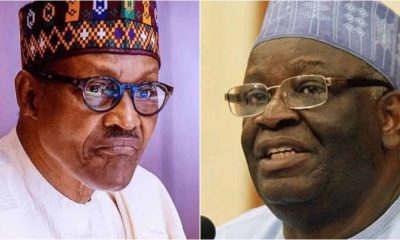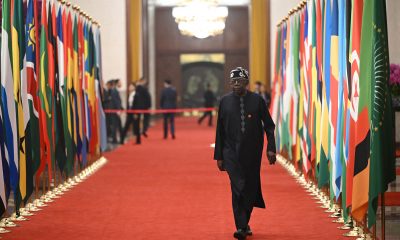Featured
Those who worked against Jonathan now control PDP
Published
5 years agoon
By
Olu Emmanuel
The Opposition Peoples Democratic Party (PDP) has been going through reforms to reactivate collective consciousness, harmony of interest, common solidarity, cohesion, and unity of purpose in the build up to the 2023 general elections. What is significant in the new efforts to reposition the PDP is that the burden of rebuilding the party is on those PDP leaders who worked against former President Goodluck Jonathan in the 2015 general elections, abandoned the former President, aligned with the All Progressives Congress (APC) to ensure Jonathan failed in that election. These political leaders now control the PDP and desperately need the party for their political ambitions in the 2023 elections.
Immediately after the 2011 general elections, a new movement emerged involving three significant opposition parties, and others, towards the formation of a mega party. The movement metamorphosed into the formation of the APC by the leading opposition party, later identified as legacy parties, which include the Action Congress of Nigeria (ACN) led by Asiwaju Bola Tinubu, the Congress for Progressive Change (CPC) led by current President Muhammadu Buhari, the All Nigeria Peoples Party (ANPP), including former Imo State Governor, Rochas Okorocha, of the All Progressives Grand Alliance (APGA), which party platform was not involved in the emergent alliance.
About two years later, some governors and their godfathers in the PDP declared strong opposition to former President Jonathan contesting the 2015 election for a second tenure, having succeeded, and completed the tenure of late President Umaru Musa Yar-Adua.
The sudden emergence of an ad-hoc mass mobilization group, the Transformation Ambassadors of Nigeria (TAN), led by Ifeanyi Uba, intensified the opposition to the second term intention of the former president. Seven PDP governors who included Governor Murtala Nyako of Adamawa State, Governor Sule Lamido of Jigawa, Governor Babangida Aliyu of Niger, Governor Rabiu Musa Kwankwaso of Kano, Governor Aliyu Magatakarda Wamakko of Sokoto, Governor Rotimi Amaechi of Rivers and Governor Abdulfatah Ahmed of Kwara, drew a battle line with former President Jonathan and were in the vanguard of open opposition to Jonathan’s second tenure intention. They not only formed an internal revolting group within the PDP, but they were also tacitly involved in the negotiations for the formation of the APC. Most of them were attending public activities of the emergent APC leaders or governors until five of the PDP G7 formally defected to the APC in November 2013. They included former Governor Rotimi Amaechi, Rivers; former Governor Nyako, Adamawa; former Governor Kwankwaso, Kano; former Governor Wamakko of Sokoto; and former Governor Ahmed, Kwara. Two governors – Sule Lamido of Jigawa and Mua’zu Aliyu of Niger, stayed back in the PDP, arguing that the initial agitation plan was not to decamp from the PDP.
In January 2014, 11 PDP senators and 37 members of the House of Representatives dumped the party and defected to the emergent APC. The senators were led by Dr. Bukola Saraki, including Senator Dino Melaye. The then Speaker of the House of Representatives, Rt. Hon. Aminu Tambuwal, who had stayed back in the PDP at the date of mass defection, subsequently defected to the APC from PDP.
While the PDP maintained the majority in the Senate, though, marginally, the PDP was pushed to the minority in the House of Representatives after the defection of the 37 members. APC then became the majority in the House of Representatives.
To reinforce the defections, former President Olusegun Obasanjo had written a very strong letter – Before It is Too Late – where he accused former President Jonathan of tribalism, among others, cautioning the former president against seeking a second term.
A northern agenda was fast unfolding for a northern presidential candidate for the 2015 elections, northern leaders had resolved to dissolve the boundaries of parties, disregard party affiliations, and vote massively for a northern candidate in the presidential election.
Senate President David Mark worked assiduously to hold the Senate together for the PDP.
Former Vice President Atiku Abubakar also defected from the PDP, for a second time, to APC in February 2014. Atiku left the PDP with a legion of PDP chieftains who included Bala Galadima, Ahmed Buraje, who was made leader of the nPDP that aligned with APC. Kawu Baraje, Chairman of the nPDP, had in a joint statement, declared: “after exhaustive deliberations, the two parties agreed to merge in order to rescue our fledgling democracy and the nation.”
However, northern leaders had decided that former President Jonathan who succeeded late President Yar’Adua in 2010, should not seek re-election. in the 2011 election, northern leaders adopted democratic process to stop Jonathan. They conducted a pre-convention primary election between some northern presidential aspirants to present a northern consensus aspirant. The mock primary election was contested by former Head of State, General Ibrahim Babangida, former Vice President Atiku Abubakar, late Adamu Ciroma, etc., the committee was headed by former PDP National Chairman, Audu Ogbe. Atiku won the mock election but lost the PDP ticket to Jonathan at the party’s national convention.
In 2015, northern leaders insisted that power must return to the north, declaring: “it is the “turn” of someone from the Muslim north to be president.”
Atiku had cited “Reign of impunity” in the PDP as reason for his defection, saying that it had led to the unprecedented division in the country along religious, regional and ethnic lines.
Some other PDP leaders said that Jonathan had an agreement to contest for one term, then step down. They accused the president of reneging on the promise to step aside after one term.
Several other PDP members from the north who stayed back in the party, including the national chairman, Adamu Mua’zu, worked against former President Jonathan in the 2015 presidential election in accordance with the directive of northern leaders.
Atiku and Kwankwaso contested the APC national convention in December 2014 for the presidential ticket and lost to Buhari.
After the 2015 general elections, Saraki struggled to get the Senate President’s office. The PDP had plotted a payback for the APC for the defection of Tambuwal with the office of the Speaker of the House of Representatives. PDP senators were mobilized to align with some APC senators to ensure Saraki emerged senate president, and Yakubu Dogara, Speaker of the House, against the plan of the APC for Ahmad Lawan in the senate, and Femi Gbajabimila in the House, who were after negotiations and conflagrations, made senate leader and House leader, respectively. The tenure was so rough for Saraki with several conflicts and cases with the police and EFCC at different times.
Again, all the defectors were not properly accommodated in the APC government and began negotiation to return to the PDP.
Accordingly, 15 Senators and 38 members of the House of Representatives, on July 24, 2018, dumped the APC, and defected to the PDP.
The senators were identified to include Barnabas Gemade (Benue), Shaaba Lafiaji (Kwara), Rafiu Ibrahim (Kwara South), and Usman Nafada (Gombe), Rabi’u Musa Kawankwaso (Kano Central), Suleiman Hunkuyi (Kaduna North), Dino Melaye (Kogi-West), Lanre Tejuoso (Ogun-Central), Ibrahim Dambaba (Sokoto), Mohammed Shittu (Jigawa), Isa Misau (Bauchi), Adesoji Akanbi (Oyo-South) and Suleiman Nazif (Bauchi).
Senators Monsurat Sunmonu (Oyo Central) and Abdul-Aziz Nyako (Adamawa) opted to defect to the African Democratic Congress (ADC).
Then Senate President Saraki as well as Speaker Yakubu Dogara later joined the defection back to the PDP.
Also, Governors Tambuwal of Sokoto, Ahmed of Kwara and Samuel Ortom of Benue returned to the PDP.
Atiku contested the 2019 presidential election on the PDP platform but lost. In the build-up to 2023, PDP has been working towards consolidating internal democracy and cohesion. Former Senate President Saraki is heading the reconciliation committee, while Atiku has adopted political simulation to ensure he gets the 2023 presidential ticket.
Again, as in the 2019 elections, Saraki, Kwankwaso, Atiku, Tambuwal, etc, are preparing for the PDP national convention for the party presidential ticket for 2023. Also, former President Jonathan has been their political ‘bride’ and reliable source of support that they are all courting, including APC leaders alleged to be making overtures to Jonathan for the 2023 presidential race. The Saraki reconciliation committee, under the pressure of APC overtures, made an urgent visit to Jonathan to regain his believe in the party.
Apparently, those who worked against former President Jonathan are now controlling and carry the burden of rebuilding the PDP.
Trending

 Latest5 days ago
Latest5 days agoYoruba film industry mourns as popular actress aunty Ajara passes away

 Trends6 days ago
Trends6 days agoTonto Dikeh reunites son with Churchill after decade-long split

 Health1 week ago
Health1 week agoControversial preprint revives vaccine–autism debate, draws sharp pushback from medical experts

 Football1 week ago
Football1 week agoEPL: Confirmed transfer deadline day deals in January 2026

 Football1 week ago
Football1 week agoRonaldo’s future at Al Nassr in doubt as €50m release clause emerges

 Latest1 week ago
Latest1 week agoEx-Buhari Chief of Staff Gambari breaks silence on “Cabal,” body double rumours

 Health1 week ago
Health1 week agoExpert tips: Keeping snakes out of your home

 Latest1 week ago
Latest1 week agoTinubu’s diplomacy key to Nigeria’s economic recovery — APC

